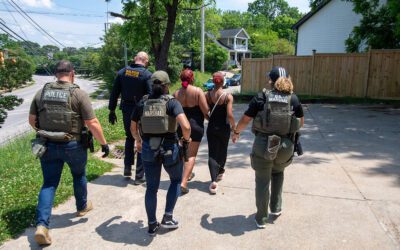As we step into the new year, January serves as a poignant reminder of our collective commitment to ending human trafficking and modern-day slavery. At AIDBIPOC (Association for Intellectually Disabled, Black, Indigenous, and People Oppressed by Color), we stand united in our efforts to raise awareness, promote prevention, and support survivors. In honor of National Human Trafficking Prevention Month, let’s reflect on the strides we’ve made and the road that lies ahead.
Progress Made:
- Legislation and International Cooperation:
Over the years, we have witnessed an increased global commitment to combating human trafficking. The adoption of international protocols and the cooperation between nations signify a shared dedication to eradicating this heinous crime.
- Advancements in Victim Support:
Efforts have been made to prioritize the needs of survivors, recognizing the importance of rehabilitation, counseling, and reintegration into society. Nonprofit organizations, governmental agencies, and communities have worked together to provide a safety net for those affected.
- Awareness and Education:
National and international campaigns have contributed significantly to raising public awareness about the signs of human trafficking. Educational programs and community outreach initiatives have empowered individuals to recognize and report potential cases.
Challenges Ahead:
- Persistent Vulnerabilities:
Despite our progress, systemic issues such as poverty, inequality, and discrimination continue to create environments conducive to human trafficking. Addressing these root causes remains a complex challenge requiring sustained effort.
-
Technological Advancements and Cyber Exploitation:
The digital age has brought new challenges, with traffickers exploiting online platforms to facilitate their activities. Tackling the intersection of technology and human trafficking demands innovative solutions and international collaboration.
- Comprehensive Support for Marginalized Communities:
Communities facing systemic oppression, including the BIPOC community, remain particularly vulnerable. Tailoring prevention and support initiatives to address the unique challenges faced by these communities is crucial for meaningful progress.
AIDBIPOC’s Role and Call to Action:
At AIDBIPOC, we are committed to championing the cause of human trafficking prevention within marginalized communities. As we acknowledge the progress made, we remain vigilant in our pursuit of a world free from exploitation and oppression.
Our Initiatives:
- Collaborating with local organizations to provide culturally sensitive support for survivors.
- Facilitating educational programs within BIPOC communities to empower individuals with knowledge and resilience.
- Advocating for policy changes that address systemic inequalities and reduce vulnerabilities.
Call to Action:
- Stay informed: Educate yourself and others about the signs of human trafficking.
- Support survivors: Contribute to organizations providing resources and assistance to survivors.
- Advocate for change: Join the conversation around policy reforms and systemic improvements to prevent trafficking.
Conclusion:
As we observe National Human Trafficking Prevention Month, let us acknowledge the progress we’ve made and recognize the work that lies ahead. At AIDBIPOC, we stand united in our mission to create a world where every individual, regardless of their background, can live free from the chains of human trafficking. Together, we can turn awareness into action and continue striving for a future where exploitation is a distant memory.





0 Comments